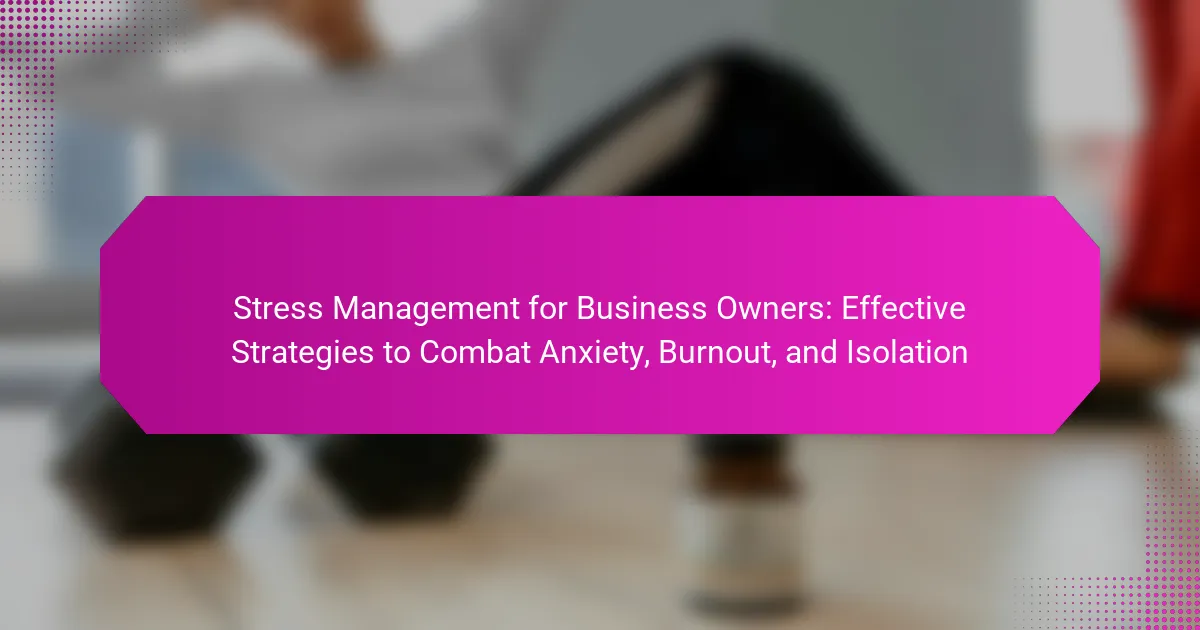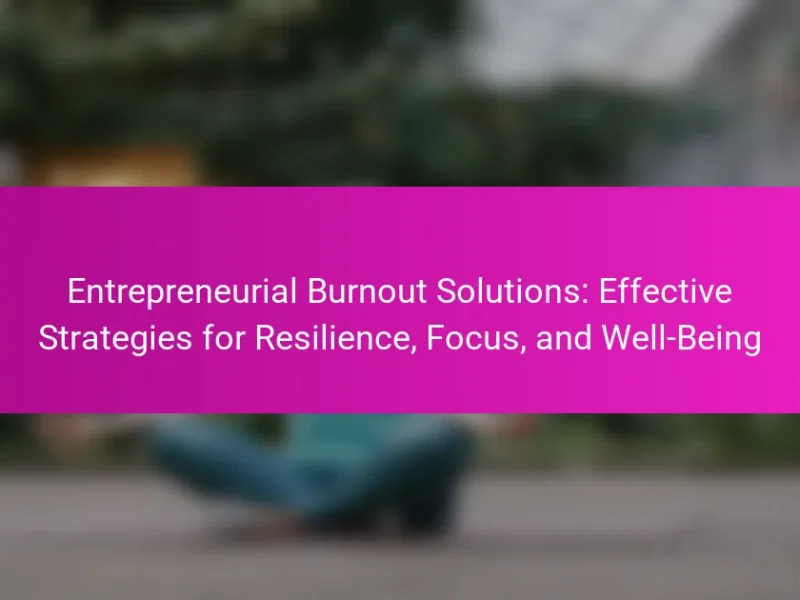Business owners often face significant mental health challenges, including stress, anxiety, burnout, and isolation. Effective strategies such as time management, physical activity, and mindfulness practices can help combat these issues. Establishing support networks and maintaining a healthy work-life balance are crucial for overall well-being. Unique approaches like nature immersion and art therapy further enhance mental resilience, promoting a healthier entrepreneurial environment.
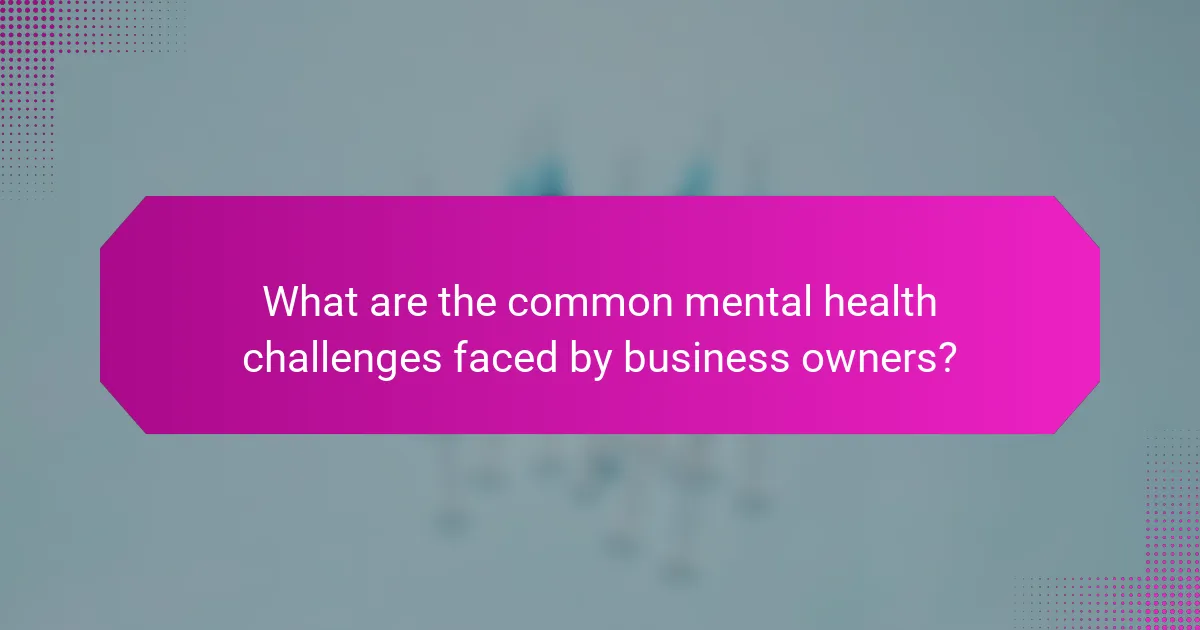
What are the common mental health challenges faced by business owners?
Business owners commonly face stress, anxiety, burnout, and isolation. These mental health challenges stem from high responsibilities, financial pressures, and long hours. Stress can lead to decreased productivity and health issues. Anxiety often manifests as worry about business performance and future uncertainties. Burnout results from prolonged stress, leading to emotional exhaustion and detachment. Isolation occurs due to the demanding nature of entrepreneurship, making it difficult to connect with others. Addressing these challenges is crucial for overall well-being and business success.
How does stress manifest in entrepreneurs?
Stress manifests in entrepreneurs through anxiety, burnout, and feelings of isolation. These responses are often triggered by high demands and uncertainty in their roles. Chronic stress can lead to physical symptoms like fatigue, headaches, and digestive issues. Additionally, entrepreneurs may experience emotional symptoms such as irritability, depression, and difficulty concentrating, impacting their decision-making and overall business performance. Implementing effective stress management strategies, such as mindfulness practices and time management techniques, can significantly alleviate these challenges.
What are the signs of burnout in business owners?
Common signs of burnout in business owners include chronic fatigue, diminished enthusiasm, and feelings of isolation. Business owners may also experience decreased productivity, irritability, and difficulty concentrating. Recognizing these symptoms early can lead to effective stress management strategies, promoting well-being and preventing further burnout.
How does isolation impact mental health for entrepreneurs?
Isolation negatively impacts mental health for entrepreneurs by exacerbating feelings of anxiety and burnout. The lack of social interaction can lead to increased stress levels, reducing overall productivity. Entrepreneurs often experience unique pressures, making them more vulnerable to mental health challenges. Engaging in regular networking or peer support groups can mitigate these effects, providing essential emotional and professional support.

What universal strategies can help manage stress?
To manage stress effectively, business owners can implement several universal strategies. Prioritise time management by setting realistic goals and deadlines. Incorporate regular physical activity to boost mood and reduce anxiety. Establish a support network to combat feelings of isolation. Practice mindfulness techniques, such as meditation, to enhance focus and resilience. Finally, ensure a healthy work-life balance to prevent burnout.
How can time management improve mental well-being?
Effective time management can significantly enhance mental well-being by reducing stress and preventing burnout. By prioritising tasks and setting boundaries, business owners can create a balanced workload. This approach fosters a sense of control, leading to decreased anxiety. Additionally, structured time management allows for scheduled breaks, promoting relaxation and improved focus. Studies show that individuals who manage their time effectively report higher levels of satisfaction and lower levels of stress.
What role does physical health play in stress management?
Physical health significantly influences stress management for business owners. Regular exercise, a balanced diet, and adequate sleep enhance resilience against anxiety and burnout. Research shows that physical activity releases endorphins, which improve mood and reduce stress levels. Additionally, maintaining good health can lead to increased energy and focus, essential for managing business challenges effectively. Prioritising physical wellness can create a foundation for better emotional health, fostering a more productive work environment.
How can building a support network alleviate stress?
Building a support network can significantly alleviate stress for business owners. It provides emotional support, practical advice, and a sense of belonging, which counteracts feelings of isolation. Engaging with peers fosters shared experiences, reducing anxiety and burnout. Research shows that social connections enhance resilience, enabling better stress management.

What unique approaches can business owners take to combat anxiety?
Business owners can adopt unique approaches such as mindfulness practices, delegating tasks, and establishing support networks to combat anxiety. Mindfulness techniques, like meditation, enhance focus and reduce stress. Delegating responsibilities helps manage workload and prevent burnout. Support networks provide emotional resilience through shared experiences. These strategies foster a healthier work environment, promoting overall well-being.
How can mindfulness techniques be tailored for entrepreneurs?
Mindfulness techniques can be tailored for entrepreneurs by integrating short, focused practices into their daily routines. These techniques help manage stress, improve focus, and enhance overall well-being.
Entrepreneurs can adopt specific mindfulness practices such as deep breathing exercises during breaks, mindful walking to clear the mind, and setting aside time for meditation. These practices reduce anxiety and combat burnout by promoting mental clarity.
Incorporating mindfulness into meetings can also be beneficial. Starting meetings with a brief mindfulness exercise fosters a centred atmosphere, enhancing collaboration and reducing feelings of isolation among team members.
Regularly scheduled mindfulness sessions can create a supportive community among entrepreneurs. This approach not only combats stress but also builds resilience, enabling business owners to navigate challenges more effectively.
What innovative stress-relief tools are effective for business owners?
Innovative stress-relief tools for business owners include mindfulness apps, virtual reality relaxation experiences, and wearable stress monitors. These tools effectively reduce anxiety and burnout. For example, mindfulness apps like Headspace offer guided meditation, while VR experiences immerse users in calming environments. Wearable stress monitors provide real-time feedback on physiological responses, allowing owners to manage stress proactively.

What rare but effective strategies can entrepreneurs adopt for mental health?
Entrepreneurs can adopt rare strategies like nature immersion, art therapy, and mindfulness retreats to enhance mental health. Nature immersion involves spending time in natural environments, which reduces stress and improves mood. Art therapy encourages self-expression and emotional processing, providing a creative outlet for anxiety. Mindfulness retreats offer structured environments for deep reflection, fostering resilience against burnout. These unique approaches can significantly improve mental well-being, helping business owners maintain focus and creativity.
How can creative outlets serve as a stress relief for business owners?
Creative outlets effectively relieve stress for business owners by providing a necessary escape from daily pressures. Engaging in activities like painting, writing, or music fosters creativity, which can enhance problem-solving skills. Research shows that creative expression reduces cortisol levels, promoting relaxation and mental clarity. Additionally, these outlets can create a sense of community, combating feelings of isolation often experienced by business owners. By integrating creative practices into their routines, entrepreneurs can improve their overall well-being and resilience against burnout.
What unconventional methods have proven successful in managing burnout?
Unconventional methods like nature immersion, art therapy, and mindfulness retreats have effectively managed burnout. Nature immersion reduces stress hormones, while art therapy fosters creativity and emotional expression. Mindfulness retreats offer deep relaxation and perspective shifts, promoting mental clarity. Each method uniquely addresses burnout by enhancing well-being through alternative approaches.
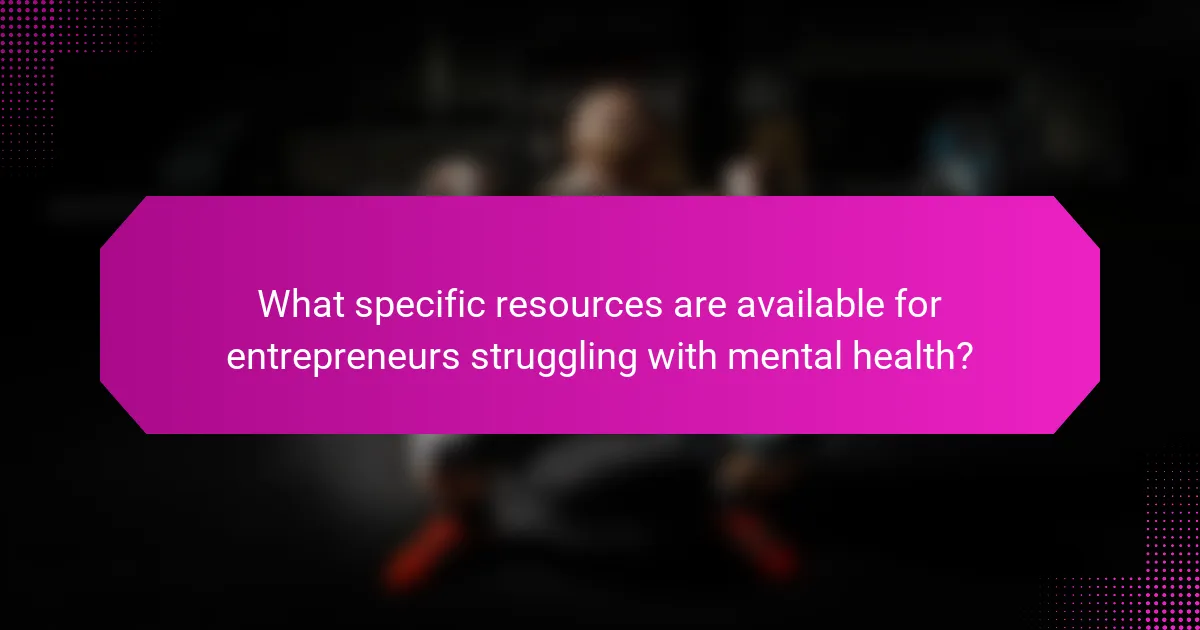
What specific resources are available for entrepreneurs struggling with mental health?
Entrepreneurs struggling with mental health can access various resources to manage stress effectively. Professional counselling services offer tailored support for anxiety and burnout. Online platforms provide mental health apps that facilitate mindfulness practices. Peer support groups create a sense of community, combating isolation. Workshops and webinars focus on stress management techniques, enhancing resilience. Additionally, business coaching can integrate mental health strategies into entrepreneurial practices.
How can professional coaching assist in stress management?
Professional coaching significantly enhances stress management for business owners by providing tailored strategies and support. Coaches help identify stress triggers and develop personalised coping mechanisms. They facilitate goal setting, accountability, and resilience building, which are crucial for combating anxiety and burnout. Regular coaching sessions offer a safe space for reflection and problem-solving, reducing feelings of isolation. By fostering a growth mindset, coaching empowers business owners to navigate challenges more effectively, ultimately leading to improved mental well-being and productivity.
What role do mental health professionals play in supporting business owners?
Mental health professionals provide essential support to business owners by offering strategies to manage stress, anxiety, and burnout. They help identify triggers, develop coping mechanisms, and promote mental well-being. Regular sessions can foster resilience, reduce feelings of isolation, and enhance overall productivity. Their expertise enables business owners to maintain a healthy work-life balance, ultimately benefiting both personal and professional growth.
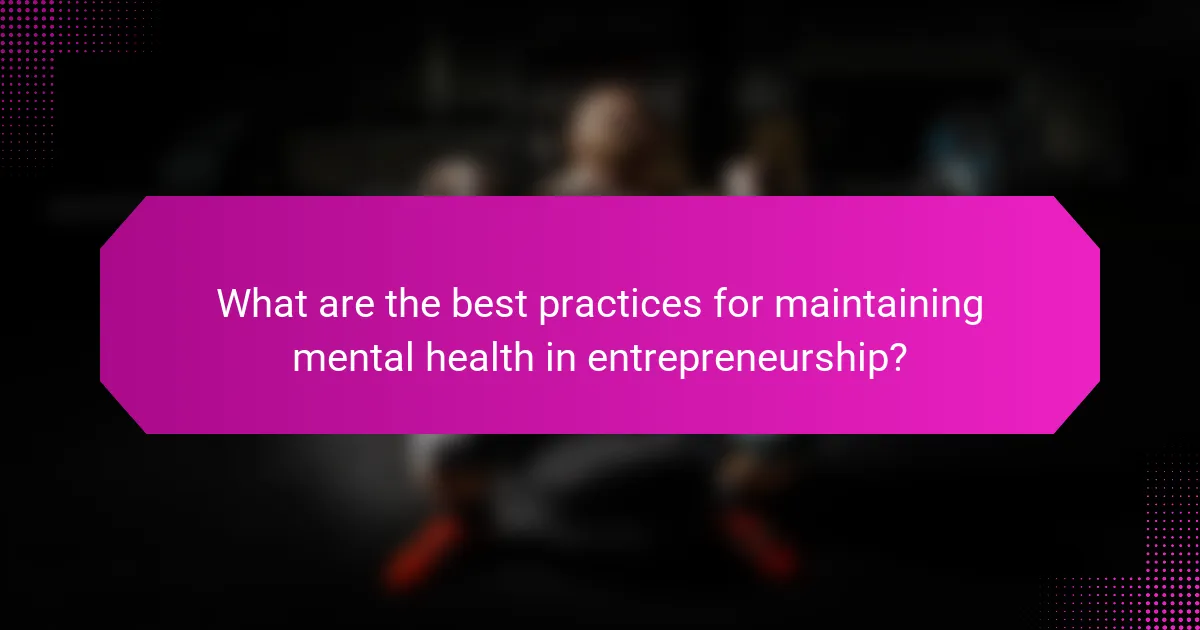
What are the best practices for maintaining mental health in entrepreneurship?
To maintain mental health in entrepreneurship, prioritise stress management through effective strategies. Regular exercise, mindfulness practices, and establishing a support network can significantly reduce anxiety and burnout. Setting clear boundaries between work and personal life fosters a healthier mindset. Engaging in hobbies and taking breaks enhances creativity and resilience.
How can setting boundaries improve work-life balance?
Setting boundaries enhances work-life balance by reducing stress and preventing burnout. Clear boundaries allow business owners to allocate time effectively, prioritising personal well-being alongside professional responsibilities. This balance leads to improved mental health, increased productivity, and stronger relationships. Establishing specific work hours can also minimise feelings of isolation, fostering a more supportive work environment. As a result, business owners experience a more sustainable approach to managing stress and maintaining overall life satisfaction.
What common mistakes should entrepreneurs avoid in stress management?
Entrepreneurs should avoid neglecting self-care, failing to delegate tasks, ignoring signs of burnout, and not establishing boundaries. These mistakes can exacerbate stress and hinder business success. Prioritising personal well-being and recognising limits are essential for effective stress management.
What expert insights can enhance stress management strategies?
Expert insights can significantly enhance stress management strategies for business owners by incorporating mindfulness techniques, time management skills, and peer support networks. Mindfulness practices, such as meditation, reduce anxiety and improve focus. Effective time management prioritises tasks, alleviating feelings of overwhelm. Additionally, engaging with peer support networks fosters a sense of community, combating isolation and burnout. These strategies collectively empower business owners to maintain mental well-being and improve productivity.
